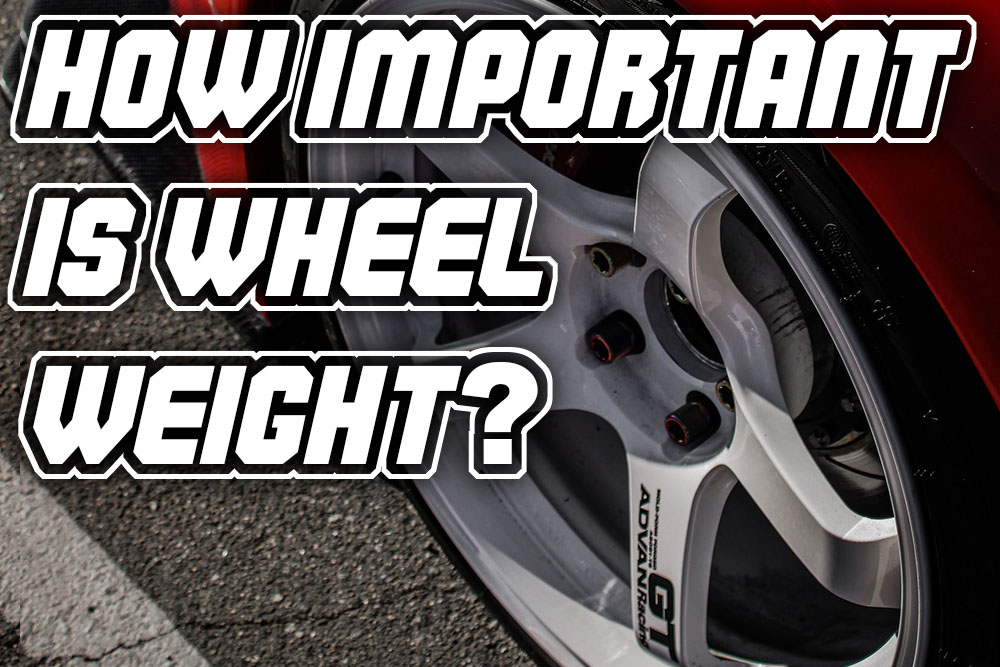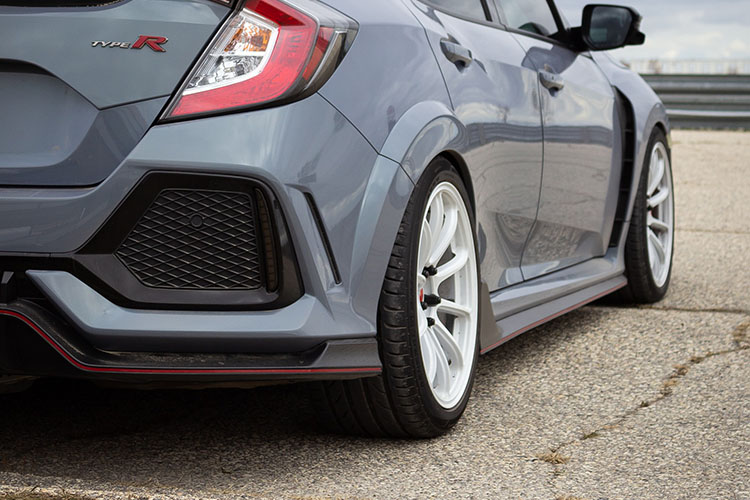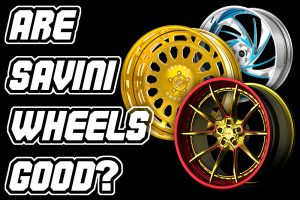Is Wheel Weight Important? The Benefits Of Lightweight Rims
Weight is one of the main topics that comes up when discussing wheels. On practically every car forum you’ll find people on both sides of the debate arguing furiously about whether wheel weight really matters or not.
In this post, I’m going to cover all the effects of wheel weight and answer the question of whether or not it really is important for your car.
What Are Sprung Weight, Unsprung Weight and Rotational Mass?
In order to answer the question on whether wheel weight matters, there are a few key points that we need to cover first.
When it comes to the weight of parts on a car, there are really three main categories:
- Sprung weight
- Unsprung weight
- Rotational mass
Sprung Weight
Sprung weight is any part of the car that is held up by the suspension. That including the body of the car, the engine, interior, driver, and a portion of certain drivetrain components such as driveshafts/axles and control arms. Wheels are not part of sprung weight.
Unsprung Weight
Unsprung weight is any part of the car that is not held up by the suspension. Wheels and tires would fall under this category, as would hubs, brakes, wheel bearings and a portion of the weight of axles and control arms.
Rotational Mass
This is any part on the car that needs to be turned in order for the car to move. Wheels, tires and brake discs would fall under this category. However, brake calipers would not, since they don’t rotate.
How This Relates to Wheels
Because wheels have a weight of their own, and they are part of the unsprung and rotational mass, they have an effect on how the car will perform and behave, and how much effort is required to move the car.
The heavier the wheel, the more unsprung weight needs to be moved, and the more force is required to get the wheels to rotate in order to move the car, and to stop the wheels from rotating in order to stop the car.
On the opposite end, lighters wheels require less effort in order to turn and stop, and add less weight to the unsprung mass.
How Wheel Weight Affects Unsprung Weight
The weight of the wheels adds to the total unsprung weight of the car. Unsprung weight is typically seen as having a bigger effect on the car than sprung weight.
Tire Grip
Unsprung weight will affect how the suspension behaves, because the suspension has to dampening the force that is produced form the unsprung weight. The more weight on this end, the harder it will be for the suspension to dampen the force.
What this means is that a heavier wheel will push against the suspension more, causing the wheel to be up in the air for longer, reducing the time the tire has full contact with the road. On a bumpy road, this will result in less traction and grip, since the suspension is less able to push the wheel and tire back down against the road.
Ride Comfort
This also means that the ride actually gets rougher, because the impact of the heavier wheel going against the suspension will be more noticeable. Now, with that said, under certain circumstances it could be argued that heavier wheels can dampen the ride a bit, but overall they will generally decrease ride comfort.
Performance
How much impact unsprung weight has in terms of performance of the car is a greatly debated topic. There are many formulas thrown around to calculate the true effects of reducing unsprung weight, but typically you will see something like removing 1 lb of sprung weight equals 4 lb of unsprung weight.
Whether that exact calculation is true or not can be debated, but what is accepted by most is that removing unsprung weight will have a bigger effect than removing sprung weight.
Removing unsprung weight will also have an impact on how responsive the car is in regards to handling. By removing weight, you make it easier for the wheels to turn, and remove load from the steering components, making the car quicker to turn and increase the feel and feedback you get.
Therefore, generally speaking, a lighter wheel will cause the car to have more grip, a more comfortable ride, handle more responsively and accelerate and stop faster.
How Wheel Weight Affects Rotational Mass
Rotational mass is perhaps even more important than unsprung weight and has a big impact on the performance of the car.
Rotating the weight of the wheel and tire takes power, and the more weight there is the more power is required.
This means that by reducing the rotational mass by installing lighter wheels, you are effectively reducing the amount of power it takes to move your car, making the car faster.
The also means that less force is required to stop the wheels from spinning, and thus stop the car, which means your brakes will work more effectively and the stopping distances will be reduced.
It also means that steering will be more responsive with lighter wheels. Heavy wheels spinning in one direction are harder to turn, whereas the lighter the wheel, the easier it will be to turn it, resulting in quicker steering changes and more responsive handling.
If you are after performance, one of the biggest things you can do is to reduce rotational mass.
In drag racing, rotational mass is a key point of focus, as it is said that removing 100 lb of sprung weight will cut your ¼ mile time down by 0.1 seconds (1 car length), whereas removing just 25lb of rotational mass will cut your time down by the same 0.1 seconds.
While this may not seem like a lot, it actually is, and if you are racing on a circuit this will add up to a huge amount over several laps.
Important Things to Know About Reducing Rotational Mass
When it comes to reducing rotational mass, there are some important things to know which will help you save weight.
Due to how torque works, you want to shave as much weight as possible from the parts of the wheel furthest from the hub – the central axis where the wheel spins.
As the weight goes further from the central axis, it gets harder to move, as it applies more opposing force in the opposite direction and has to travel a larger distance.
By reducing the weight that is furthest out, you require less force to rotate the wheel.
This means that reducing the weight of the tire is actually going to have the most impact, with the barrel of the wheel being next.
This is one of the reasons that flow formed wheels have become so popular. Due to the way they are made, the barrel is stronger yet weights less than a cast wheel, which helps significantly with keeping this weight that is furthest from the hub down.
Do Lightweight Wheels Actually Make a Difference?
Like most things when it comes to performance, it depends on the particular situation, other supporting mods and what you are going to do with the car.
If the stock wheels are very heavy and you swap them for a set of lightweight wheels, chances are you are going to feel a difference in both performance and handling.
However, if the wheels you currently have weight only a few pounds or kilograms more than your new set, you probably won’t feel much of a difference unless you are at the track timing your laps or ¼ mile runs.
Here is a really good video showing a comparison between stock wheels and lightweight wheels and the car’s acceleration:
Overall, lightweight wheels are going to make a difference even at the slightest weight reduction, but whether you will notice it is the question.
Are Lightweight Wheels Worth It?
This really depends on what you are trying to get out of the car.
If the car is just your daily driver or a show car and you are not too worried about squeezing out every last drop of performance, handling or MPG, then they are probably not worth worrying about, especially if you really want some other wheels that are a bit heavier.
However, if you are really into saving on gas, or you are using the car for performance driving, particularly in competitive racing, then lightweight wheels are going to make a noticeable difference and are probably worth it for you.
Do Lightweight Wheels Help Save Gas?
Due to reducing the weight and thus reducing the power required to move the car, lightweight wheels actually help with reducing how much fuel your car uses.
While this may not be a priority for people looking to maximize the performance of their car, it is still a benefit that comes at no added cost along with the other benefits of lightweight wheels.
TireRack did some tests and found that by reducing wheel weight by only 3 lb (1.3 kg) per wheel, fuel economy on the freeway was improved by 5%, and even more in city driving due to the constant stopping and starting.
So, to answer the question: Yes, lightweight wheels do help to save gas.
Why Are Lightweight Wheels So Expensive?
The reason why so many lightweight wheels are expensive is because in order to make a lightweight wheel, you have to use certain manufacturing methods in order to make them strong enough despite the low weight.
In order to do this, the wheel has to be flow formed or forged, which, especially in the case of forging, is a complicated process that requires expensive materials and equipment, as well as man hours, to create the strong, lightweight wheel.
This results in the expensive price tags and often makes lightweight wheels not worth it for the average person.
Is Wheel Weight Or Tire Weight More Important?
This goes back to what I was saying earlier with regards to rotational mass.
Technically, you would want to reduce the weight of the tire first, as that is the part that is furthest out from the hub.
However, there isn’t really a great deal of weight difference between different tyres, unless you go for a smaller tire size. The problem with that is it will impact how much traction you get, and as a result most people focus on the wheels as the part to reduce the most weight, as the only negative with lightweight wheels is the cost. If you can find lighter tires, then definitely go for them.
Which Wheels Are the Most Lightweight?
There are three main ways that wheels are made that you are going to come across:
- Cast
- Flow formed
- Forged
Cast wheels are the cheapest but they are also the heaviest. These are common as OEM wheels as well as the cheaper aftermarket wheels.
Flow Formed wheels are relatively new and offer a low priced option for strong, lightweight wheels. These are often the best choice between affordability and performance.
Lastly you have forged wheels, which are the lightest and cheapest, but also the most expensive by a long shot. While these are the ultimate for lightweight performance, most people can’t afford a set of forged wheels, so flow formed wheels are the next best thing.
You also have carbon fiber wheels, but these are not necessarily significantly lighter than forged but are much more expensive, so at the moment they are primarily a fashion piece more than anything else.
Conclusion – What Are the Benefits of Lightweight Wheels?
To conclude this article, these are the benefits of lightweight wheels.
Better Performance
Lightweight wheels will offer better performance for your car by allowing it to accelerate and stop faster. The lighter the wheels, the less power it takes to move them, and the less force it takes to stop them, resulting in a better performing car overall.
Better Handling
Lightweight wheels also significantly improve your car’s handling because they allow the car to react faster and steer the wheels easier, which makes for more responsive handling, quicker turning and more feel for the driver.
More Traction
Because lightweight wheels reduce unsprung mass, the suspension has an easier time doing its job to keep the wheel and tire pushed against the ground. This means that after a bump, the suspension will be able to push the wheel and tyre down quicker, resulting in more time that the tyre has full contact with the road, giving you more traction.
Better Mileage
Because lightweight wheels reduce the weight and mass of the car, less power is required and therefore less gas is used. Even a small reduction in wheel weight can have significant impacts on the car’s fuel economy, particular in city driving and stop start traffic.
More Ride Comfort
Lightweight wheels also make it easier for the suspension to do its job which actually results in a more comfortable ride in most circumstances. Because the suspension has less forces working against it when going over bumps, it is able absorb the bumps easier and increases ride comfort.
The Only Downside to Lightweight Wheels
There is only one real downside to lightweight wheels and that is the cost. Lightweight wheels are more expensive than most other wheels, usually significantly so. However, with the invention of flow forming, lightweight wheels have become much more affordable and are now not even that much more expensive than typical cast aftermarket wheels.
Best Lightweight Wheel Brands
If you are looking at getting a set of lightweight wheels for your car, here are the wheel brands I would recommend looking at:
- BC Racing Coilovers Review – Are They Any Good? - September 12, 2024
- 8+ Best Nissan 350Z Coilover Guide In 2025 - September 12, 2024
- Top 6 Best 2015 Subaru WRX Coilovers - September 12, 2024











